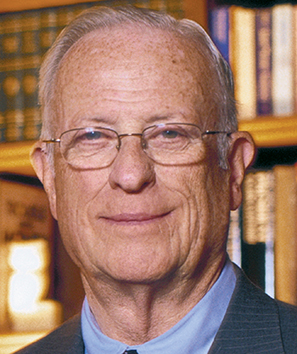The American Bar Association is mourning the passing of William G. (Bill) Paul (Chickasaw), a leader in the legal profession and the ABA’s first Native American president. Known for his dedication to justice, equity, and diversity, Paul left a legacy that continues to shape the legal field today. Mr. Paul was 94.

On November 20, 2003, he was inducted into the Chickasaw Hall of Fame. Paul's great-great-grandparents founded the city of Pauls Valley, Oklahoma, In addition, his great-grandfather was a senator in the Chickasaw Nation in the late 1800s and his father was president of the Oklahoma Senate, according to the Chickasaw Hall of Fame website.
Successful in his own right, Paul served as ABA president from 1999 to 2000, but his contributions to the profession spanned decades. A partner at the Oklahoma-based firm Crowe Dunlevy for 59 years, he was also general counsel and senior vice president of Phillips Petroleum for a decade.
Paul’s legal career was briefly interrupted by two years of service in the U.S. Marines during the Korean War in 1952.
A proud graduate of the University of Oklahoma and its law school, Paul never forgot the barriers many aspiring lawyers face. Alongside his wife Barbara and his law firm, he helped launch the ABA Legal Opportunity Scholarship Fund with an initial $100,000 contribution, aimed at supporting students from underrepresented backgrounds.
“Bill Paul’s integrity, wisdom, and unwavering commitment to justice left a lasting mark on the legal profession and the American Bar Association,” ABA President William R. Bay said in a statement. “He believed deeply in creating opportunity for those who had long been overlooked.”
Paul also made history presiding over the ABA’s rededication of the Magna Carta monument in England, standing beside Queen Elizabeth II and Prime Minister Tony Blair during the ceremony.
Throughout his career, Paul was deeply respected by peers across the country, not just for his accomplishments, but for his character.
Former ABA president William Hubbard described him as “a truly kind, caring gentleman and an inspiration for so many of us.” Martha Barnett, who succeeded Paul as ABA president in 2000, simply called him “a gentleman and indeed a prince.”
“He saw how we could make voluntary funds available to incentivize young people to consider becoming law students but lacked the funds to consider their dream,” Dennis Archer, another past ABA president and former mayor of Detroit said. “What a legacy.”
Paul’s leadership extended beyond the ABA. He served as president of the Oklahoma Bar Association and the National Conference of Bar Presidents.
In addition to being named to the Chickasaw Hall of Fame, Paul was inducted into the Oklahoma Hall of Fame in 2003, and received the ABA Spirit of Excellence Award in 2002.
Robert Grey, president of the Leadership Council on Legal Diversity, called Paul “a generational leader… a champion of fairness and equity.” His example continues to inspire today’s legal leaders and advocates.
More Stories Like This
Native News Weekly (August 25, 2024): D.C. BriefsUS Presidents in Their Own Words Concerning American Indians
Indigenous Actor Elaine Miles Reports Detention by Alleged ICE Agents
Happy Thanksgiving from Native News Online
Coming Up on Native Bidaské: Behind the Animation: Joey Clift Talks “Pow” and Native Storytelling
Help us tell the stories that could save Native languages and food traditions
At a critical moment for Indian Country, Native News Online is embarking on our most ambitious reporting project yet: "Cultivating Culture," a three-year investigation into two forces shaping Native community survival—food sovereignty and language revitalization.
The devastating impact of COVID-19 accelerated the loss of Native elders and with them, irreplaceable cultural knowledge. Yet across tribal communities, innovative leaders are fighting back, reclaiming traditional food systems and breathing new life into Native languages. These aren't just cultural preservation efforts—they're powerful pathways to community health, healing, and resilience.
Our dedicated reporting team will spend three years documenting these stories through on-the-ground reporting in 18 tribal communities, producing over 200 in-depth stories, 18 podcast episodes, and multimedia content that amplifies Indigenous voices. We'll show policymakers, funders, and allies how cultural restoration directly impacts physical and mental wellness while celebrating successful models of sovereignty and self-determination.
This isn't corporate media parachuting into Indian Country for a quick story. This is sustained, relationship-based journalism by Native reporters who understand these communities. It's "Warrior Journalism"—fearless reporting that serves the 5.5 million readers who depend on us for news that mainstream media often ignores.
We need your help right now. While we've secured partial funding, we're still $450,000 short of our three-year budget. Our immediate goal is $25,000 this month to keep this critical work moving forward—funding reporter salaries, travel to remote communities, photography, and the deep reporting these stories deserve.
Every dollar directly supports Indigenous journalists telling Indigenous stories. Whether it's $5 or $50, your contribution ensures these vital narratives of resilience, innovation, and hope don't disappear into silence.
 The stakes couldn't be higher. Native languages are being lost at an alarming rate. Food insecurity plagues many tribal communities. But solutions are emerging, and these stories need to be told.
The stakes couldn't be higher. Native languages are being lost at an alarming rate. Food insecurity plagues many tribal communities. But solutions are emerging, and these stories need to be told.
Support independent Native journalism. Fund the stories that matter.
Levi Rickert (Potawatomi), Editor & Publisher

